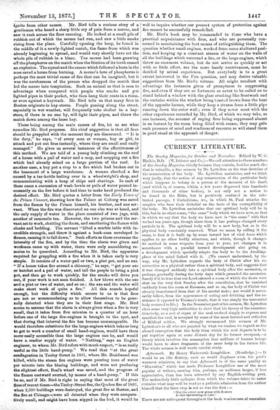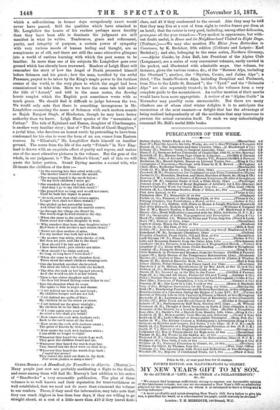Aftermath. By Henry Wadsworth Longfellow. (Boutledge.) — It would be
an idle flattery, such as would displease even the poet's warmest admirers, to say that Aftermath is of the same quality as "Hiawatha," which has made Professor Longfellow one of the most popular of writers, earning him, perhaps, an audience larger, if loss appreciative, than has been attracted by any English-writing poet. The melancholy little epilogue from which the volume takes its name contains what may well be read as a pathetic admission from the author himself that the later crop is not as was the first : — "Not the sweet new grass with Bowen Is this harrestIng.of oars."
There are not unfreqnent throughout the book weaknesses of execution which a self-criticism in former days scrupulously exact would never have passed. Still the qualities which have attached to Mr. Longfellow the hearts of his readers perhaps more forcibly than they have been able to dominate the judgment are still manifest in what he writes. Tenderness, grace and refinement, purity, and integrity of purpose, a certain power of sympathy with very various moods of human feeling and thought, are as eonspicnous as of old, and there are still the same attractive glimpses into a world of curious learning with which the poet seems to be familiar. In more than one of his subjects Mr. Longfellow goes over ground which has already been traversed. Readers of Leigh Hunt will remember the story of how the Angel of Death presented himself before Solomon and his guest ; how the man, terrified by the awful Presence, prayed to be taken by the King's magic power to the furthest corner of the world, to the very place to which the angel had been commissioned to take him. Here we have the same tale told under the title of "Azrael," and told in the same metre, the flowing heroic couplet which the English poet sometimes wrote with so much grace. We should find it difficult to judge between the two. We would only note that there is something incongruous in Mr. Longfellow connecting the name of Solomon with such modern sounds as Rajah Runjeet Singh, of Hindostan, though he may have better authority than we know. Leigh Hunt speaks of the "mountains of Cathay." The tale of Eginhard and Emma, daughter of Charlemagne, is another very familiar story ; that of "The Monk of Casal-Maggiore," a jovial friar, who deceives an honest rustic by pretending to have been condemned for his sins to wear the form of an ass, comes from Eastern sources. In "Elizabeth," Mr. Longfellow finds himself on familiar ground. The scene from the life of the early "Friends" in New Eng- land is drawn with an exquisite effect of purity and repose, null makes one of tho most attractive pictures in the volume. But the gem of the whole, in our judgment, is " The Mother's Ghost," and of this we will quote the latter portion. Svend Dyring marries a second wife, who ill-treats the children of the first:— "In the evening late they cried with cold ;
• The mother heard it under the mould.
"The woman heard it the earth below: 'To my little children I must go.'
"She standeth before the Lord of all : 'And may I go to my children small ? '
" She prayed him so long, and would not cease, Until he bade her depart in peace.
" At cock-crow thou shalt return again; Longer thou shalt not there remain I' "She girded up her sorrowful bones, And rifted the walls and the marble stones.
"As through the village she flitted by, The watch-dogs howled aloud to the sky.
"When she came to the castle gate, There stood her eldest daughter in wait.
"' Why standest thou here, dear daughter mine ? How fares it with brothers and sisters thine?'
" Never art thou mother of mine, For my mother was both fair and fine.
" 'My mother was white, with cheeks of red, But thou art pale, and like to the dead.'
" ' How should I be fair and fine ?
I have been dead ; pale cheeks are mine.
"How should I be white and red, So long, so long have I been dead ?'
" When she came in at the chamber door, There stood the small children weeping sore.
"One she braided, another she brushed, The third she lifted, the fourth she hushed.
" The fifth she took on her lap and pressed, As if she would male it at her breast.
"Then to her eldest daughter said she, 'Do thou bid Svend Dyriog come hither to me.'
"Into the chamber when he came She spoke to him in anger and shame.
"4 I left behind me both ale and bread ; My children hunger and are not fed.
"'I left behind me quilts of blue ; My children lie on the straw ye strew.
"'I left behind me the great waxlight ; My children lie in the dark at night.
". If I come again unto your hall, As cruel a fate shall you befall !
"Now crows the cock with feathers red; Back to the earth must all the dead.
"'Now crows the cock with feathers swart ; The gates of heaven fly wide apart.
"'Now crows the cock with feathers white ; I can abide no longer to-night.'
"Whenever they heard the watch-dogs wail, They gave the children bread and ale.
" Whenever they heard the watch-dogs bay, They feared lest the dead were on their way.
" Whenever they heard the watch-dogs bark ; 1 myself was young I
They feared the dead out there in the dark. Fair words gladden so many a heart."



































 Previous page
Previous page